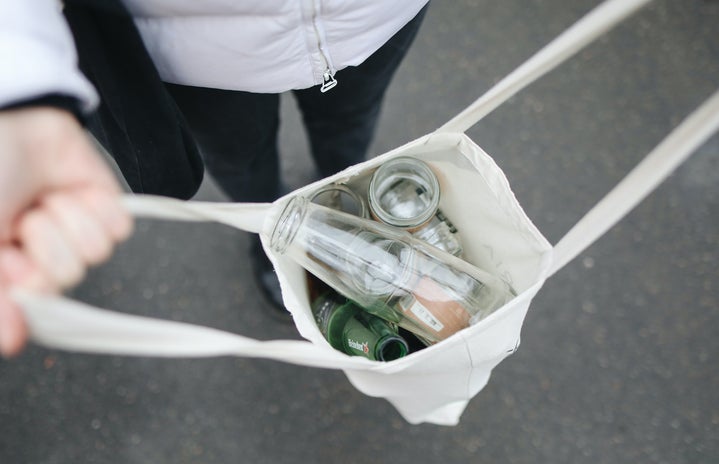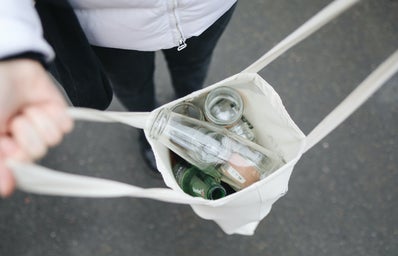Everyone is trying to do their bit to save our planet but sometimes, despite our best intentions, creating a more sustainable lifestyle appears difficult and complex. But don’t worry, my tips will transform you into an eco-warrior in no time!
Reuse and Recycle
It has been said many times before about trying to recycle but often there are more complications to this than first appears. To ensure that your rubbish is recycled and doesn’t end up in landfill, the best solution is to check with your council about want can and can’t be recycled. This is really important as one rogue plastic tray in the bin for cardboard can mean that the whole lot ends up in landfill. Similarly, it is important that the rubbish in recycling is clean. This means that tin cans shouldn’t still have baked beans in them and bottle tops on wine bottles should be removed.
Perhaps the easiest way to prevent rubbish going into landfill is to buy products with minimal packaging or without plastic completely. Maybe swap your regular, bottled shampoo with a shampoo bar or get reusable pads to remove your makeup instead of your usual cotton wool pads.
Transport for Two
Cars release CO2 and cause air pollution as well as requiring many non-renewable resources to build and maintain. This contributes to global warming. To reduce CO2 emissions and the rate of global warming, it is worth considering other modes of transport before jumping in your car.
Walking has many health benefits as well as being significantly better for the environment. So, instead of driving to your lecture, set your alarm slightly earlier and get out and embrace nature before starting your day. Not only will this reduce your carbon footprint, many studies show that exercise also helps your mental health.
If walking is not your thing or the thought of setting your alarm a few minutes earlier sounds like hell, then maybe consider using a bike. Exeter has many cycle paths you can use as a quick and simple way to get to where you need to go.
In reality, walking and cycling everywhere isn’t always an option, so for longer distances, opt for public transport. This reduces the number of individual cars on the road, preventing traffic jams and, most importantly, decreasing the number of cars producing greenhouse gases.
If you do need to use a car, perhaps think about car-sharing. Like with public transport, this means fewer cars are being used. It also means that you now have a partner to duet with on your Spotify favourites!
Waste not, want not
As a country we waste 9.5 million tonnes of food a year (as of 2018). This is largely due to overbuying, a common problem when you are cooking for one! Nevertheless, it is still possible to reduce food waste. Firstly, instead on buying for one, why not share items such as milk, bread, eggs and vegetables, with your flatmates? You could also start cooking together. Not only is it more fun, but it also means that instead of just using ¼ of an onion, you use the whole thing. Plus, this often works out cheaper. Alternatively, make better use of your freezer by buying frozen food (which lasts longer) and batch cook sauces, stews, and chillies. This can be a great time-saver as well.
Another way to prevent food being wasted is to buy ‘imperfect’ fruit and veg. This is food, which is wonky or bruised, meaning that supermarkets cannot sell them for their usual price, so they are often cheaper. So, next time you’re in Tesco’s, look out for these sustainable bargains.
When you are using fruit and veg by sure to save the ‘inedible’ parts. These could either be composted or regrown. To regrow leafy vegetables, place the inedible end of the vegetable in shallow water near a window. After a few days, you should see new leaves beginning to appear. A similar method can be used for vegetables like onions by placing the base of the onion in water. Likewise, retaining the tops of root vegetables and placing these in water will also result in growth. These can either be kept in the kitchen or transferred to soil. If you want to expand your kitchen garden further, then plant the seeds of peppers and other fruits in a small pot of soil in a warm part of your kitchen. Fruits take slightly longer to grow so you may not see anything for a month or so. Just make sure you don’t forget to water them!
It’s also worth mentioning that buying local (from places like Shillingford Organics in Exeter) can help reduce food miles and your carbon footprint. In addition, not only is the food tastier, buying locally helps support local businesses.
Sustainable Shopping
We have all been there! A quick pop to the shops to get some food essentials and before you know it, you’re in the Hollister changing rooms, about to buy yet another pair of jeans which you know you definitely don’t need. However, as much as you want those jeans, regularly buying new clothes can seriously increase the amount in landfill. In fact, according to ClothesAid, 350,000 tonnes of wearable clothes end up in landfill each year. So, what can we do to prevent this?
Try to resist buying clothes unless you need them. This will ensure that you get longer wear out of the clothes you already have as well as saving you money which would otherwise go on clothes which, let’s be honest, you probably don’t need. However, this doesn’t mean that we can’t treat ourselves once in a while. Instead of going to your favourite high street brands, how about trying a charity shop first? Not only will you be helping the planet by reducing the clothes in landfill, but you are also supporting fantastic charities as well. Similarly, if you have a top which may be isn’t to your fancy anymore, why not donate it so it can find a new home? Apps like Vinted allow you to sell your unwanted clothes online. These apps are easy to use and help you make money on stuff you don’t wear anymore.
If you do fancy treating yourself, then look out for eco-friendly brands, like the ones listed below:


